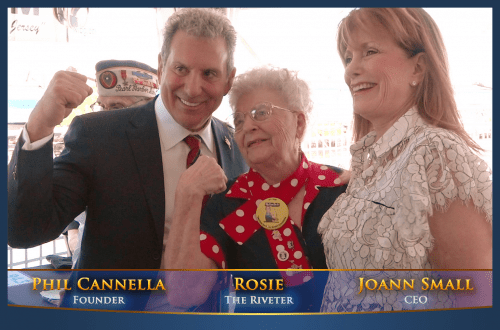This website is strictly for educational purposes and is not intended to provide specific legal, financial, or tax advice. Phil Cannella and Joann Small are licensed professionals in the insurance industry. Crash Proof Retirement, LLC. does not recommend or sell securities to anyone at any time. Any interviews conducted by Retirement Media, Inc ®. published on this website are not to be considered endorsements. Crash Proof Retirement, Crash Proof Retirement Show, and Retirement Media, Inc. ®, and all related uses, are federally trademarked with the United States Patent and Trademark Office. Any company or individual found violating these federal trademarks will be vigorously pursued through all available legal avenues and penalized to the fullest extent of the law. © 2024 Crash Proof Retirement, All Rights Reserved.

Crash Proof Retirement Supports Rosie the Riveter Congressional Gold Medal Act
- September 13, 2018
- Phil Cannella
- Press Releases
- 0 Comments
King of Prussia, PA — Phil Cannella, retirement-phase expert and founder of Crash Proof Retirement, along with CEO Joann Small, are well known in the Philadelphia and South Florida areas for supporting causes that matter to them. Now they’re throwing their support behind a national movement named for World War II icon Rosie the Riveter which would award a Congressional Gold Medal to “Rosie the Riveters,” representing all the women who went to work or volunteered in support of the war effort. Cannella and Small hope to harness the collective power of their staff, supporters, and radio listeners to convince Congress to recognize the hard work of millions of women who gave their time and energy to assure an Allied victory in World War II.
Cannella and Small’s efforts are centered around the passage of House Bill S.2500, known as the “Rosie the Riveter Congressional Gold Medal Act of 2018.” If passed, this bill would direct the House Speaker and President pro tempore of the Senate to award the Congressional Gold Medal, which would be accepted on behalf of all women who found employment or volunteered during the war. The medal would be displayed at the National Museum of American History and would serve to inspire a new generation of women and girls to pursue their passions and find careers they can be proud of. The medal would also be made available for temporary display at other venues and events associated with Rosie the Riveter.
The driving force behind this bill is 92-year-old Mae Krier, an original “Rosie” who helped build B-17 and B-29 airplanes at Boeing in Seattle, WA during World War II. Krier has spent over thirty years working to have women recognized for their wartime contributions and in 2017, her efforts helped create the first national observance of Rosie the Riveter Day, which occurs annually on March 21st.
“The millions of American women were amazing during WWII,” Krier said. “When they hired us, they didn’t ask if we were a Democrat or a Republican, they asked us to help save our country, which we did. Our Veterans will tell you that they couldn’t have won the war if it hadn’t been for all the equipment that the women made for them. We deserve this Congressional Gold Medal, and it shouldn’t have taken our country 75 years to realize this.”
During World War II, the U.S. was left with a critical shortage of workers when millions of men were drafted into the war effort. While American troops fought overseas, factories back home found they couldn’t produce fast enough to keep up with demand. These included not only domestic producers, but producers of war material as well, who needed workers to manufacture munitions, warships, planes, and more. Seeing the plight of these producers, the U.S. government stepped in, providing an advertising campaign aimed at encouraging women to join the workforce.
Their ace in the hole for this campaign was a plucky, bandana-wearing riveter who later became known as Rosie. Although many different images of Rosie were used over time, an illustration by Pittsburgh artist J. Howard Miller proved to be the most iconic, now called the Westinghouse Poster. This poster featured Rosie, decked out in red bandana and blue overalls, flexing her muscles and saying, “We can do it!”
Decades after the war, Rosie the Riveter, as depicted on the Westinghouse Poster, stood the test of time, becoming an enduring symbol of American feminism and the economic power of women in the workforce. The Rosie the Riveter Congressional Gold Medal Act aims to commemorate and preserve the rich history of this symbol and ensure generations of Americans have a chance to understand its power and its role in World War II. If you would like to get involved in Phil Cannella and Joann Small’s efforts, all you have to do is visit https://crashproofretirement.com/rosie/ and fill out their form, which will generate a letter you can download, as well as instructions on how to mail it to the Senate Committee on Banking, Housing, and Urban Affairs.


Leave a Reply
You must be logged in to post a comment.